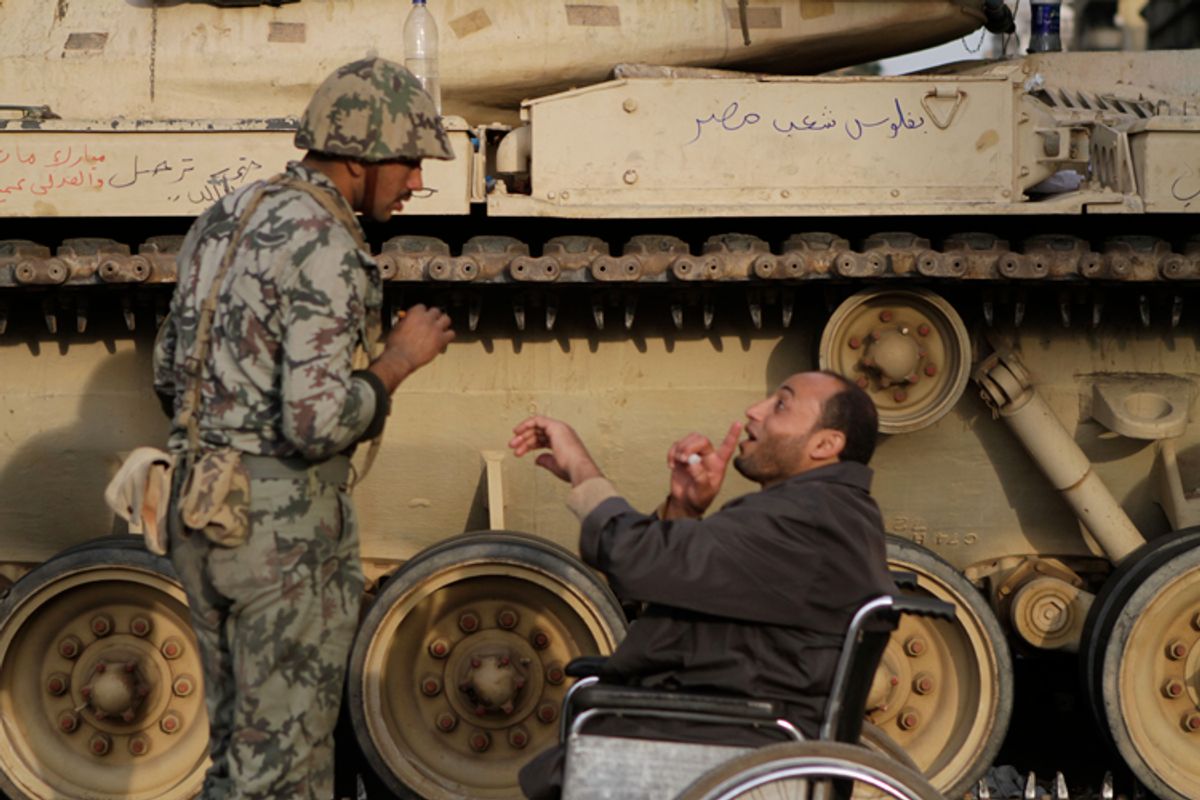Have you ever been alone in a house at night and thought you heard someone breaking in, and laid awake, immobilized by fear, watching moving shadows until day breaks and the ordinary objects of your home are no longer monsters? That is how I felt walking around the streets of downtown Cairo yesterday.
We arrived in Tahrir Square around 3 p.m. to find an army checkpoint, formed by two tanks, at the entrance to the square from Qasr El-Aini Bridge. Someone had scrawled "Fuck Mubarak" on the back of one of the tanks. Soldiers checked bags and patted people down for weapons.
Beyond this a man stood holding a piece of paper above his head reading, "Have some respect for yourself Mubarak and leave."

To the side of him men swept the ground and picked up litter, a sight I have witnessed numerous times in Tahrir Square and which never fails to move me. Cairo is a notoriously filthy city and littering is a huge problem; now here was one man picking up tiny bits of paper off the ground. He has reclaimed ownership and now he and the thousands of others sleeping, eating, singing and resisting in the square feel a duty to look after it and surrounding streets in a way the government never did.
Shortly after I arrived two jet fighters started circling overhead, flying so low that it hurt my ears. Some people cheered, others began chanting, mesh meshyeen, mesh meshyeen ["we’re not moving"]. The message these jets were sending is unclear. Mubarak is an air force man; were they expressing loyalty to him? Were they air force jets or did they belong to the Presidential Guard (a force composed of around 22,000 men that is reportedly fiercely loyal to Mubarak)?

If the intention was to frighten people it didn't work; nobody moved -- and in fact most people ignored them, because they were too busy being amazing. Small groups have formed all over the square; some people have erected tents, some are standing on top of street signs waving flags. At night there are small fires around which people sit and discuss events. Waves of chants come from all directions and a sense of freedom and possibility pervades everything.
As soon as I arrived I realized why state media has ramped up the looting and pillaging rumors, which on Saturday prompted protesters to leave Tahrir Square; it is a desperate effort to break spirits and get them out. People are not frightened of tear gas or bullets anymore; the old tactics no longer work because they have discovered the strength of numbers, and of camaraderie. If this is in any doubt, watch protesters force riot police to retreat in this incredible video. I hope Western leaders have seen it. This is how the supposedly politically moribund Arab street frees itself, Mr. Bush.
There are no cars on the streets leading off Tahrir Square, and everywhere there is anti-government graffiti. My favorite was, "Your last flight will be to Saudi, Mubarak," and "I want to see a new president before I die." Most shops are still closed. Families and groups investigate the area, reveling in the open streets and clean air (another byproduct of the uprising, less traffic). People are running the city with oversight from tanks, and army jeeps stand guard on some street corners. The soldiers I have interacted with have all been incredibly polite and efficient, but, alas, some of them are a bit funny about people photographing their tanks.
The streets leading to the Interior Ministry are a scorched mess of twisted metal and broken glass. Protesters destroyed anything they could get their hands on. Meanwhile, police snipers and riot police shot protesters using live ammunition. People were still scared to approach the Interior Ministry a day after the battle because of the sniper issue.

Seeing these burned-out shells has been extremely gratifying. For three years I reported on cases of torture, disappearances and brutality at the hands of this institution. My heart sank every time I was with a male friend and we had to deal with a police officer on any level because I knew the outcome of that encounter would be decided by a million factors other than justice and rule of law.
We ran into a labor lawyer in downtown who said hello and then left us, saying, "I’m going to go and breathe in freedom." For the first time in my life I walked down an Egyptian street yesterday and didn't see a single policemen, not a single man in plainclothes with the crackling walkie-talkie and the ability to casually change your life forever in a second. I was free.



Shares